×
The Standard e-Paper
Join Thousands Daily

For the record, there are 15 independent candidates in Kenya's Senate and National Assembly. They survived the big political party waves and made it to Parliament on their own strategic campaigning.